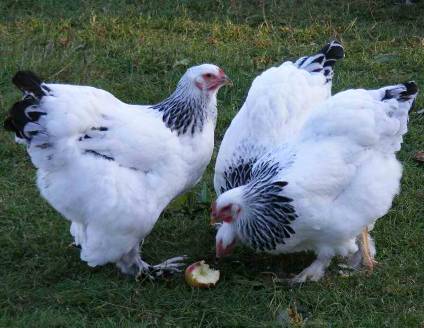Can Chicken Be Feed Other Than Grain
Not only that, your costs will plummet and the meat will be better too. The truth is that you don't have to feed chickens grain, and they will be healthier birds if you don't. Chickens raised in this manner don't need drugs or vaccinations to remain disease-free. Imagine organic meat and eggs that are safer, and cheaper to produce.
Chickens naturally prefer bugs, grubs and worms over that modern concoction so ingrained in raising chickens for meat or eggs. Before farm machinery entered the picture, chicken and eggs were a staple on every farm, but no one was feeding them grain. They ate kitchen scraps and whatever they scrounged up scratching around in the soil and barnyard. All you need is a compost pile that is part food scraps, part horse or cow manure, and part bad hay.
 Why have you never heard of this before? Because there is only one farm that raises their chickens in this manner. It began as sort of an experiment after a local vegetarian restaurant's composting waste out back got vetoed by the city. So Vermont farmer, Karl Hammond agreed to let the owner send his pile and future waste out to the farm. The question of just how much grain do chickens actually need came up, and the answer surprised everyone being the answer was zero percent of their daily diet.
Why have you never heard of this before? Because there is only one farm that raises their chickens in this manner. It began as sort of an experiment after a local vegetarian restaurant's composting waste out back got vetoed by the city. So Vermont farmer, Karl Hammond agreed to let the owner send his pile and future waste out to the farm. The question of just how much grain do chickens actually need came up, and the answer surprised everyone being the answer was zero percent of their daily diet.
Sound too crazy to be true? How about this? The farm has a flock of 1200-1400 free-range chickens that feast on the fresh compost piles 365 days a year, and he's been doing his egg production this way since 1998. Fifteen years and thousands of dozens of eggs later, it would be hard to say it's a questionable practice. The only grain used at all in Karl's flock is for newly hatched chicks who are fed mash for a few days before being released to work the compost piles with the big birds. He's not loosing huge portions of his flock to illness, though there is always some loss over a year with chickens through predators and accidents. Especially when they have the run of the place, though intrusion and theft of his chickens is kept to a minimum by well-trained German Shepherds who guard them constantly.
There's a lot more to know about the no-grain way of keeping chickens and the practices used on Karl Hammond's egg farm. His chickens range even in winter, but the compost piles make this possible, and they continue to lay eggs in winter too with LED lit egg sheds. The best cold tolerant breeds have small combs like Australorps and Light Brahma chickens. They are less apt to suffer frostbite than fancy comb and wattle breeds. Montpelier, Vermont is in USDA growing zone 4b where it can be as cold as -20 to -25F in the winter. Obviously, these are some hardy chicken breeds!
This no-grain/recycling system is totally sustainable food production and a beneficial service to the community providing a receptacle for compostable waste. And the chickens keep working the compost pile for you. Just an added benefit. Let your birds do some of the work involved in composting. Following Karl's lead, you can even get paid to haul away community food waste – as long as you undercut the local dump by a long shot.
More info:
- Richmond Times Dispatch
- Modern Homstead
- Know Your Egg Shed
Note: There are some references to Hammond's flock being 400 strong in recent news. I think they have picked up some old information because the more mainstream news sources state 1200-1400 chickens in pieces published over the past couple of years. Just to make you aware of what looks like a typo or reporting from old sources.
Similar articles
Source: https://gardenculturemagazine.com/better-eggs-from-backyard-chickens-without-grain/
0 Response to "Can Chicken Be Feed Other Than Grain"
Post a Comment